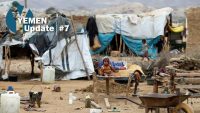
Crisis Group Yemen Update #11
This week, we focus on the first step towards force redeployments in Hodeida and the response of the UN Security Council.
Trendline: Unilateral Redeployment
Five months after the UN brokered an agreement to demilitarise the Red Sea port city of Hodeida, there has finally been movement on the ground. Yet not everyone is happy.
Briefing the UN Security Council on 15 May, Special Envoy Martin Griffiths announced that military forces loyal to the Huthi (Ansar Allah) movement had withdrawn from the three main ports on Yemen’s Red Sea coast – Hodeida, Ras Issa and Saleef – in a first step towards implementing the Stockholm Agreement he brokered in December 2018.… Seguir leyendo »










